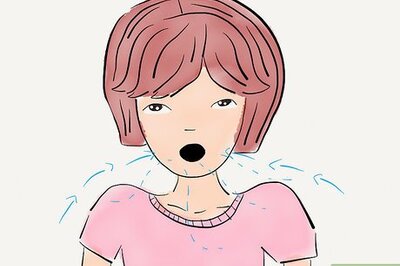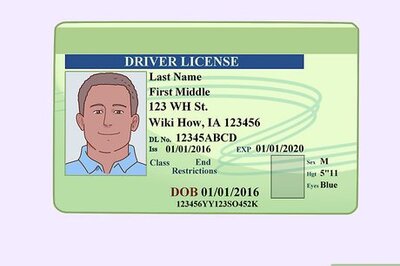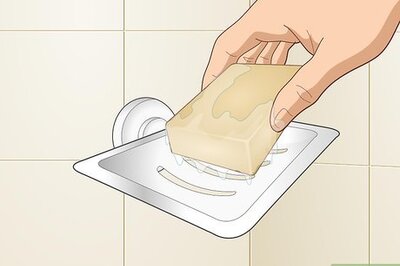
views
ChristChurch/Wellington, New Zealand: Australian Brenton Harrison Tarrant, 28, a suspected white supremacist, was charged with murder on Saturday after 49 people were killed and dozens wounded in mass shootings at two New Zealand mosques.
Tarrant, handcuffed and wearing a white prison suit, stood silently in the Christchurch District Court where he was remanded without a plea. He is due back in court on April 5 and police said he was likely to face further charges.
Friday's attack, which Prime Minister Jacinda Ardern labelled as terrorism, was the worst ever peacetime mass killing in New Zealand and the country had raised its security threat level to the highest.
Footage of the attack on one of the mosques was broadcast live on Facebook, and a "manifesto" denouncing immigrants as "invaders" was sent to politicians and media outlets and posted online via links to related social media accounts.
The video showed a man driving to the Al Noor mosque, entering it and shooting randomly at people with a semi automatic rifle. Worshippers, possibly dead or wounded, lay on the floor, the video showed.
At one stage the shooter returns to his car, changes weapons, re-enters the mosque and again begins shooting. The camera attached to his head recording the massacre follows the barrel of his weapon, like some macabre video game.
Forty-one people were killed at the Al Noor mosque.
Police said the suspect took seven minutes to travel to the second mosque in the suburb of Linwood, where seven people were killed. No images have emerged from there.
Tarrant was arrested in a car, which police said was carrying improvised explosive devices, 36 minutes after they were first called.
"The offender was mobile, there were two other firearms in the vehicle that the offender was in, and it absolutely was his intention to continue with his attack," Ardern told reporters in Christchurch on Saturday.
Ardern's office said the suspect sent the "manifesto" by email to a generic address for the prime minister, the opposition leader, the speaker of the parliament and around 70 media outlets just minutes before the attack.
A spokesman said the email did not describe the specific incident and that there was "nothing in the content or timing that would have been able to prevent the attack."
The staff member monitoring the accounts sent it to parliamentary services as soon as they saw it, who sent it to police, the spokesman said.
The visiting Bangladesh cricket team was arriving for prayers at one of the mosques when the shooting started but all members were safe, a team coach told Reuters.
Two other people were in custody and police said they were seeking to understand whether they were involved in any way.
None of those arrested had a criminal history or were on watchlists in New Zealand or Australia.
SORROW, SYMPATHY
Twelve operating theatres worked through the night on the more than 40 people wounded, said hospital authorities. Thirty- six people were still being treated on Saturday, 11 of whom remained in intensive care. One victim died in hospital.
"Many of the people require multiple trips to the theatre to deal with the complex series of injuries they have," said Christchurch Hospital's Chief of Surgery Greg Robertson.
One victim posted a Facebook video from his hospital bed, asking for prayers for himself, his son and daughter.
"Hi guys how are you. I am very sorry to miss your calls and text messages...I am really tired...please pray for my son, me and my daughter...I am just posting this video to show you that I am fully ok," said Wasseim Alsati, who was reportedly shot three times.
Dozens of people laid flowers at cordons near both mosques in Christchurch, which is still rebuilding after an earthquake in 2011 killed almost 200 people.
Wearing a black scarf, Ardern hugged members of the Muslim community at a Christchurch refugee centre, saying she would ensure freedom of religion in New Zealand.
"I convey the message of love and support on behalf of New Zealand to all of you," she said.
The majority of victims were migrants or refugees from countries such as Pakistan, India, Malaysia, Indonesia, Turkey, Somalia and Afghanistan. Muslims account for just over 1 percent of New Zealand's population.
"I'm not sure how to deal with this. Forgiving is going to take time," Omar Nabi, whose father Haji Daoud Nabi was gunned down, told reporters outside the Christchurch court. Nabi's family left Kabul, Afghanistan, for New Zealand in the 1970s.
Abdikina Ali-Hassarn and his family moved to New Zealand from Somalia four years ago and were regular worshippers at the Linwood mosque.
"I can't even go to the mosque now because I am scared of that happening again," the 16-year-old told New Zealand television. He said his mother, who was at the Linwood mosque with his father and brother, saw two people shot.
"She came here for the peace...now she is shocked," he said, adding his mother was too afraid to leave her house.
None of the bodies of the victims were immediately released due to the investigation, leaving families unable to bury their dead within the 24 hours customary in Islam.
GUN LAW REFORMS
Ardern said Tarrant was a licensed gun owner who allegedly used five weapons, including two semi-automatic weapons and two shotguns, which had been modified.
"I can tell you one thing right now, our gun laws will change," Ardern told reporters, saying a ban on semi automatic weapons would be considered.
New Zealand has in the past tried to tighten firearm laws, but a strong gun lobby and culture of hunting has stymied such efforts. There are an estimated 1.5 million firearms in New Zealand, which has a population of only five million, but the country has had low levels of gun violence.
Tarrant lived in Dunedin, on New Zealand's South Island, and was a member of the Bruce Rifle Club, according to media reports which quoted club members saying he often practiced shooting an AR-15, which is a lightweight semi automatic rifle.
The AR-15 is a semi-automatic version of the United States military M16 rifle. The minimum legal age to own a gun in New Zealand is 16, or 18 for military-style semi-automatic weapons.
Police Association President Chris Cahill backed tighter gun laws, saying the weapons used in the mosque shootings were banned in Australia after the Port Arthur massacre in 1996 in which 35 people were gunned down.
The AR-15 was used at Port Arthur, as well as a number of high-profile mass shootings in the United States.
WORLD CONDEMNATION
Leaders around the world expressed sorrow and disgust at the attacks, with some deploring the demonisation of Muslims.
US President Donald Trump, who condemned the attack as a "horrible massacre", was praised in the accused gunman's manifesto as "a symbol of renewed white identity and common purpose".
Ardern said she had spoken with Trump, who asked how he could help. "My message was sympathy and love for all Muslim communities," she said she told him.
On Saturday, the White House said U.S. Vice President Mike Pence spoke with New Zealand's Deputy Prime Minister Winston Peters on Friday to express condolences for "the despicable terror attacks."
Pence also affirmed US cooperation in ensuring all the perpetrators were brought to justice. "These acts of hate have no place in the diverse and tolerant society for which New Zealand is justly known," the White House statement said.

















Comments
0 comment